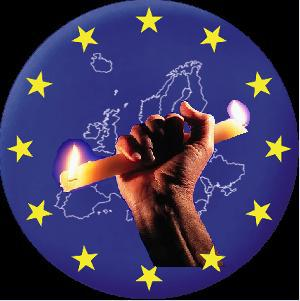When you look into all this bizarre activity of the European Union with its 80,000 pages of regulations it looks like Gosplan. (Vladimir Bukovsky)
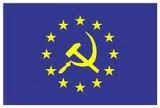 The EU was and still partly is a bold and unique project. It resembles less that of the United States of America and more that of the Soviet Union. Until the last decade the EU has been more or less a community of democratic nations. In my opinion EU has been moving more and more towards Federalism and in Eurozone even towards Unitary system; from my perspective now is the time make an u-turn and start to develop EU towards (Democratic) Confederalism.
The EU was and still partly is a bold and unique project. It resembles less that of the United States of America and more that of the Soviet Union. Until the last decade the EU has been more or less a community of democratic nations. In my opinion EU has been moving more and more towards Federalism and in Eurozone even towards Unitary system; from my perspective now is the time make an u-turn and start to develop EU towards (Democratic) Confederalism.
While the USSR was a communist dictatorship the EU has been following its steps last years due a full-on economic crisis. Vladimir Bukovsky a former soviet dissident, once made a comparison: ‘We were told, that the purpose of the Soviet Union is to create a new historic entity, the soviet people, and that we must forget our nationalities, our ethnic traditions and customs. The same seems to be true to the European Union. They don’t want you to be British or French, they want you to be a new historic entity: European.’ There is amazing similarity in decision making between EU and ex-Soviet Union. USSR had also some “democratic” institutions like parliament and government, but the real power was in party machine and its politburo”. Anyway as USSR already went so shutdown of EU has now started due BREXIT and hopefully soon will it be possible to celebrate EU remembrance Day.
I share in the highest degree the ideas of Abdullah Öcalan’s – leader of the Kurdistan Workers’ Party -paper on Democratic Confederalism . He e.g. notes
that Democratic confederalism is based on grass-roots participation. Its decision-making processes lie with the communities. Higher levels only serve the coordination and implementation of the will of the communities that send their delegates to the general assemblies. For limited space of time they are both mouthpiece and executive institutions. However, the basic power of decision rests with the local grass-roots institutions.
Although in democratic confederalism the focus is on the local level, organizing confederalism globally is not excluded.
From history: The supranational organisation planned by Nazis?
‘In 50 years’ time nobody will think of nation states.’ (Joseph Goebbels)
EU gratuitously got Nobel award as a peace project: to underscore the very reason that it was created on 9 May 1950, which was to limit any future wars or conflicts on the continent (more in my article Devaluation of Nobel Peace Prize Continues But EU Could Show Way For Better Crisis Management ). An alternative history shows that EU is continuation of war with economic means. This view came to my mind while reading about now published secret report about how Nazis were planning the Fourth Reich.
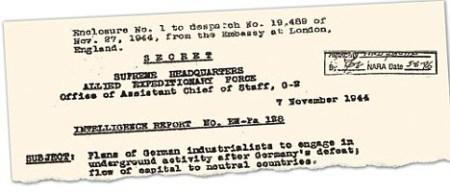
The document, also known as the Red House Report, is a detailed account of a secret meeting at the Maison Rouge Hotel in Strasbourg on August 10, 1944. There, Nazi officials ordered an elite group of German industrialists to plan for Germany’s post-war recovery, prepare for the Nazis’ return to power and work for a ‘strong German empire’. In other words: the Fourth Reich.detailed how the industrialists were to work with the Nazi Party to rebuild Germany’s economy by sending money through Switzerland.
They would set up a network of secret front companies abroad. They would wait until conditions were right. And then they would take over Germany again. The industrialists included representatives of Volkswagen, Krupp and Messerschmitt. Officials from the Navy and Ministry of Armaments were also at the meeting and, with incredible foresight, they decided together that the Fourth German Reich, unlike its predecessor, would be an economic rather than a military empire – but not just German. The Third Reich was defeated militarily, but powerful Nazi-era bankers, industrialists and civil servants, reborn as democrats, soon prospered in the new West Germany. There they worked for a new cause: European economic and political integration.
Ludwig Erhard (economist) pondered how German industry could expand its reach across the shattered European continent. The answer was through supranationalism – the voluntary surrender of national sovereignty to an international body. German industrialists were also members of the European League for Economic Co-operation, an elite intellectual pressure group set up in 1946. The league was dedicated to the establishment of a common market, the precursor of the European Union. Ludwig Erhard flourished in post-war Germany. Adenauer made Erhard Germany’s first post-war economics minister. In 1963 Erhard succeeded Adenauer as Chancellor for three years.
Germany and France were the drivers behind the European Coal and Steel Community (ECSC), the precursor to the European Union. The ECSC was the first supranational organisation, established in April 1951 by six European states. It created a common market for coal and steel which it regulated. This set a vital precedent for the steady erosion of national sovereignty, a process that continues today. However one should remember that the German economic miracle – so vital to the idea of a new Europe – was built on mass murder and gold looted from the treasuries of Nazi-occupied countries and that a European federal state is inexorably tangled up with the plans of the SS and German industrialists for a Fourth Reich – an economic rather than military empire.
Scientists can argue if this alternative view about EU origins is valid or not, however in my opinion e.g. EU’s actions with financial crisis during last years give cause for claim that this alternative history might be true.
[Source: I have summarized this secret report item from: The secret report that shows how the Nazis planned a Fourth Reich – in the EU by Adam Lebor]
European Parliament?
Forgetting EU’s organogram as illusion and speaking today’s reality one can easily find different decision making practices in EU depending about importance of issue. Most important core group is cooperation between France and Germany sometimes earlier (pre-€) adding UK to group. Commission of course has great de facto power not only on implementation level but also designing proposals handled in EUs inner cores; the same can be said about bureaucrats in national ministries who are designing policies decided EU meetings at summit/ministry levels.
So where is this leaving European Parliament? It may handle some energy bulb level issues but honestly the whole institution seems to be unnecessary creation only to keep some democratic illusion on show. As EU citizens are not so stupid to keep his institution more than a puppet theatre they show their attitude by low turnout percentage. Before one EU Parliament elections I proposed and argued (in my article Let’s elect Donkey Parliament) why replacing MEPs with monkeys might not be so bad idea. Today EP is practical place to locate some second class politicians for retirement or out to not make any mess in national policy. They also can show good places to get fresh mussels while voters are visiting in EP as their quests. Designing EU policy happens anyway somewhere else.
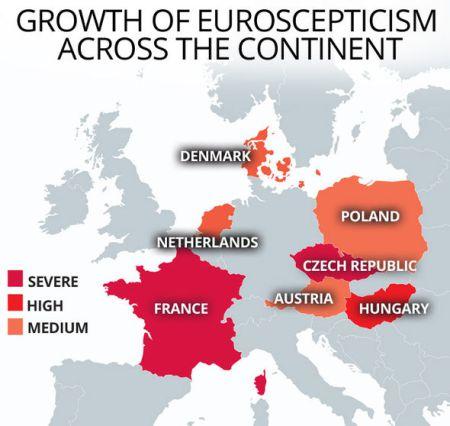
EU today
The two dominating trends among EU leaders are to cut losses of players in virtual economy at the expense of taxpayers and to guide EU towards strict federation at the expense of democracy. (Ari Rusila)
In EU today the ‘austerity’ measures are destroying national economies making it impossible for them to ever to pay back those debts created by banksters of virtual economy and their political cabals. At grassroots people have become the victim of parasitic credit capitalism and its unelected institutions. Neoliberal capitalism has been winning ground last 30 years. During last five years emergency economics has made it possible to replace democracy with debtocracy. EU and especially Eurozone today is in condition which was recognized by Abraham Lincoln already one and half century ago as follows:
“I see in the near future a crisis approaching that unnerves me, and causes me to tremble for the safety of our country. Corporations have been enthroned, an era of corruption will follow, and the money power of the country will endeavor to prolong its reign by working upon the prejudices of the people, until the wealth is aggregated in a few hands and the republic is destroyed.” (Roberts, Archibald E., Bulletin–Committee to Restore the Constitution, Feb. 1989, p. 6 )
Coming back to present-day EU I see two dominating trends among EU leaders: First is to cut losses of players in virtual economy at the expense of taxpayers and the second is to guide EU towards strict federation at the expense of democracy. Change to this is needed for saving 99 % of people instead saving profits of the rest one per cent. With today’s strategy there is a risk that the combination of economic insecurity and political paralysis has been recipe for an increase in extremism and xenophobia. It is slow motion death spiral of economic collapse. That is the base to my view that people and the real world should be the first priority and not virtual economy, fiscal system, euro or EU elite. In my opinion it is time to whistle game out, collect losses and start new game in Day after Euro/EU context.
It would seem nowadays that the Eurozone leaders have decided to place the region under Martial law. Old principles about democracy, subsidiarity etc are forgotten. From my viewpoint intervene again and again into something that is not going to work in the long run is the wrong medicine.
Way forward
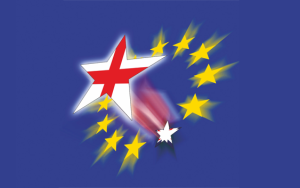 EU Out movement now got big boost due BREXIT.The Britons had their own motivation to pull out from EU as well other populist movements in EU (to keep poor immigrants out, rich ones can buy entrance anyway as usual) and leftist grassroot movements (to stop austerity measures). Whatever reasons are the aim is against EU’s federalist development.
EU Out movement now got big boost due BREXIT.The Britons had their own motivation to pull out from EU as well other populist movements in EU (to keep poor immigrants out, rich ones can buy entrance anyway as usual) and leftist grassroot movements (to stop austerity measures). Whatever reasons are the aim is against EU’s federalist development.
Quite common view is that EU is an opaque bureaucracy cut off from the citizens it was (publicly) intended to serve. The unofficial core and value of EU in my opinion is that EU is a system to protect, favor and facilitate the interests of big economic powers. A steady decline in voter turnout over the past three decades for European elections has lent credence to the idea that citizens feel increasingly estranged from the European project. The crisis appears to be making this worse by prompting politicians to rush through policies that concentrate more power in Brussels with limited public understanding or support.
From my point of view subsidiary principle should be widen so that more legislation should be implemented at national level and those few remaining issues could be decided between governments and implemented by slimmed European Commission and its agencies. With this approach the whole EP could be closed as useless extra body. This outcome – which I have called as EU lite version – is about the opposite to ongoing federalist tendency and indeed I support rebuilding EU with Confederalist approach. This subject I dealt recently with my article My 1st May Manifesto .
The best scenario from my point of view could be some kind of EU Lite version. A bit of similar ”privileged partnership” agreement than planed with Turkey (to keep it out from EU). EU Lite should be build simply to EU’s early basics as economical cooperation area including a customs union, the EU tariff band, competition etc linked to idea of the Common Market. EU Lite could also apply a structure of Confederation. Federalist intentions, the EU puppet parliament and the most of EU bureaucracy should from my point of view put in litter basket together with high-flown statements and other nonsense. In my opinion average citizen does not need EU to decide how wide tires one have in tractor or how big curve bananas can have. Most topics can more democratic way be handled at national level. For international affairs – e.g climachange, civil liberties, development aid – there are lot of official forums as well NGO-cooperation.
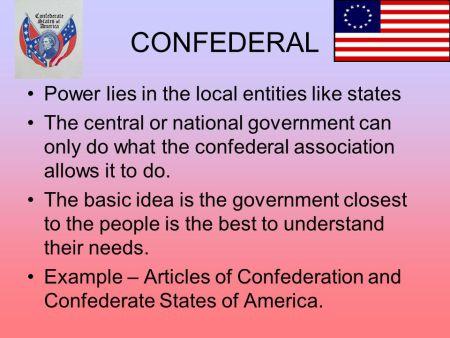
Even I sited Lincoln above I see some benefits with Confederalist view in new desirable politics. Policy-making starts from community assemblies based on the practices of participatory democracy and continues further by interlinking villages, towns, neighborhoods, and cities into confederal networks. Power thus flows from the bottom up instead of from the top down like today. With critical issues – such as human rights, civil liberties, international policy etc political units can adopt a common constitution while the task of central governments would be providing support for all members. Democratic Confederalism is based on grass-roots participation. Its decision-making processes lie with the communities; in conclusion my vision is decentralized society a network of directly democratic citizens’ assemblies in individual communities/cities organized in a confederal fashion.
Sure the scenario above can be seen as Utopian – however from my perspective the process or moving towards that Utopia is the core question.
Epilogue
Financial speculators, banksters and EU elite can congratulate themselves for creating such a massive well connected system –called EU that it is hard to break. The citizens have enjoyed from few benefits such as student exchange programme, Schengen area and common agricultural policy which subsidized farmers to produce goods that nobody wanted, dumped excess supply on world markets creating falling incomes for world farmers. The decline of EU as actor in international politics continues with its disastrous European External Action Service (=foreign policy, EEAS) so that the union can concentrate to its core function as distributor of agricultural funds and as aggregate of high-flown statements. The present challenge is, how to distance unsatisfied citizens and state parliaments away from disturbing egocentric and self-governing elite. I hope that grassroots finally will get fed up with this experiment and starts to demand some power back.
My bottom line:
- People first system after
- Power flow from the bottom up
- Money for the people not the banks
- From private to public money creation
- Real economy instead of virtual economy
- Investor risk instead of taxpayers risk
